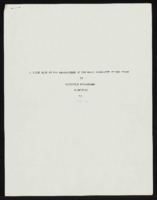Search the Special Collections and Archives Portal
Search Results

Donna Robinson oral history interview: transcript
Date
Archival Collection
Description
Oral history interview with Donna Robinson conducted by Barbara Tabach on December 20, 2019 for the Remembering 1 October Oral History Project. Robinson begins by talking about her family and childhood in Pittsburgh, Pennsylvania. She talks about her family life and how she started working at the American Red Cross as a Disaster Program Specialist. Robinson describes her first disaster situation she worked through, later disaster situations, and the different training that is required in order to handle certain situations. Robinson then begins to talk about October 1, 2017, and how she tried to help as many people as possible that night. Then she talks about the long-term effects of the shooting and how it impacted the survivors and the community. She discusses the mental health aspect of the services Red Cross had and how it still continues to serve the community today.
Text

Ernest Oon oral history interview: transcript
Date
Archival Collection
Description
Oral history interview with Ernest Oon conducted by Cecilia Winchell, Stefani Evans, and Jerwin Tiu on February 16, 2023 for the Reflections: the Las Vegas Asian American and Pacific Islander Oral History Project. In this interview, Oon recalls his childhood in Singapore, where his father worked on the Health and Sports Council for the Singaporean Government and his mother worked as a television assistant producer. Growing up, Oon recalls being very active, participating in everything from soccer to Tae Kwon Do. In an effort to continue his education without being being interrupted by Singapore's civil service program, Oon applied to college in the United States and ended up attending California State University. Although he was on the medicine track in Singapore, he switched to finance. After a series of jobs within credit banking, he is now a chief credit officer for Bank of Nevada. Throughout the interview, Oon reflects on the changes in his life living in different places, the street food from Singapore, and his unique tennis game.
Text

"A Brief Look of the Development of the Black Community of Las Vegas": manuscript draft by Roosevelt Fitzgerald
Date
Archival Collection
Description
From the Roosevelt Fitzgerald Professional Papers (MS-01082) -- Unpublished manuscripts file.
Text

Rocio Rodríguez-Martinez oral history interview: transcript
Date
Archival Collection
Description
Oral history interview with Rocio Rodríguez-Martinez conducted by Elsa Lopez and Monserrath Hernández on June 21, 2019 for the Latinx Voices of Southern Nevada Oral History Project. Rocio shares her personal history growing up in Bogotá, Colombia and how she immigrated to the United States. She talks about motherhood, her Latina identity, and her experiences raising her daughter in Los Angeles and Las Vegas with her husband. Rocio also discusses her employment history and how she was able to achieve her professional goals of becoming a Spanish and English teacher for the Clark County School District (CCSD)'s Family and Community Engagement Services (FACES) program. Her interview is conducted in Spanish. Subjects discussed include: Bogotá, Colombia; El Salvador; Family and Community Engagement Services (FACES).
Text

Astrid Silva oral history interview: transcript
Date
Archival Collection
Description
Oral history interview with Astrid Silva conducted by Monserrath Hernández and Barbara Tabach on April 22, 2019 for the Latinx Voices of Southern Nevada Oral History Project. Astrid Silva was born in Gomez Palacio, Durango in 1988. She immigrated with her mother to the United States in 1992, where they were met by her father before flying to Los Angeles. She recounts her first impression of the United States and her families eventual move to Las Vegas, where she describes her time living in Las Vegas' west side and struggles she faced being an undocumented student living in Las Vegas. She describes her first meeting with Senator Harry Reid and the friendship that developed afterwards. She has spoken at the Democratic National Convention and has been vocal about her status as a Dreamer. She is currently the Executive Director for DREAM Big Nevada which was established in 2017 in order to provide aid to Nevada's immigrant families. She writes about her hopes for Dreamers and her continued work in expanding the ways that immigrant families can be helped in an always changing political climate. Subjects discussed include: DACA, Dreamers, Immigrant Rights, and Higher Education.
Text

Juliana Urtubey oral history interview: transcript
Date
Archival Collection
Description
Oral history interview with Juliana Urtubey conducted by Nathalie Martinez and Barbara Tabach on May 24, 2021 for the Latinx Voices of Southern Nevada Oral History Project. Born in Colombia, Julia was able to immigrate with her family to the United States when she was six years old. The family lived in Chicago, Illinois and later in Phoenix, Arizona. Juliana moved to Las Vegas in 2013 and taught learners with special education needs at the elementary level. In 2021, she was named the National Teacher of the Year, the first Latina and the only Nevadan to ever hold the distinction. Juliana personally received the award from Dr. Jill Biden. Subjects discussed include: Colombia, Chicago, Illinois, National Teacher of the Year, and bilingual education.
Text

Transcript of interview with Bruce Layne by Claytee D. White, June 18, 2004
Date
Archival Collection
Description
Bruce Layne came to Las Vegas in March of 1955 when he was 10 years of age. He attended High school at Bishop Gorman and college at the University of Nevada Las Vegas where he received a B.S. in Economics. In college, he played baseball for three years and was named All Conference Player in 1966. Growing up in Las Vegas, two of his closest long time friends are Governor Bob Miller and Tito Tiberti. Bruce later went on to become the President of Layne & Associates Insurance which was the largest Insurance Agency in Nevada. Bruce tells fabulous stories of his 40-year experience in the Las Vegas community. When he first arrived there were only about 25,000 people living here. Since then, Bruce has been witness to the enormous growth the city has undergone. Throughout the interview, he discusses his book, My Gift, which he wrote after he discovered he had Parkinson's disease in 1999. The book contains valuable advice on life and it has touched the lives of many people who have read it. Today Bruce Layne is relentlessly fighting his battle with Parkinson's disease both for himself and for thousands of others. He continues to have a positive attitude and is supported by his wife, Sherry Layne, and his two sons, Chad and Trevor. VI
Text
Temple Beth Sholom
Temple Beth Sholom was the first Jewish congregation in Southern Nevada and continues to function as a religious, educational, and social center for a considerable portion of the Jewish community of Las Vegas. Previously known as the Jewish Community Center of Las Vegas, it became affiliated with the Conservative Movement and officially known as Temple Beth Sholom in 1958. The congregation originated in Las Vegas in the 1930s with a small group of families and grew to be the largest temple in Nevada during the 1960s.

Charles Scott Emerson oral history interview: transcript
Date
Archival Collection
Description
Oral history interview with Charles Scott Emerson conducted by Claytee D. White on December 21, 2017 for the Remembering 1 October Oral History Project. In this interview, Charles Scott Emerson discusses his work with the American Red Cross and the disaster relief the organization provided during the aftermath of the October 2017 mass shooting in Las Vegas, Nevada. The interview begins with a discussion on Emerson's early life and career in Missouri and how he moved to Las Vegas in 2004. Emerson talks about the American Red Cross response plans and coordinated operations that are in place for when the community is faced with a disaster, going into specific detail on the community-wide response to the October 1, 2017 shooting. He gives a behind-the-scenes glimpse into how relief work is organized, using this interview as a chance to praise the hidden heroes of the October 2017 tragedy, including the people at the Family Assistance Center, the Attorney General's Office, the Driver's License Bureau, and the Coroner's Office, as well as mental health providers, child care workers, blood donors, and more. Throughout the interview, Emerson puts special emphasis on the importance of community in order to offer support in the aftermath of a tragedy as well as to prevent a man-made tragedy from occurring again.
Text
